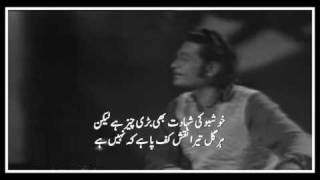It is the month of Ramadan and Ghalib has his share of quotes for the season. Ghalib was known for his wit, when asked how many fasts he had kept he is reported to have replied ek na rakha (I did not keep one). Typical Ghalib.
But in his tongue-in-cheek manner Ghalib also pushes his readers to think of many other aspects of a situation than the one that seems obvious on the surface.
Our choice this week reflects this quality of Ghalib:
iftaar-e-saum kii jise kuch dast.gaah ho
us shakhs ko zaroor hai rozaa rakha kare
jis paas roza khol ke khaane ko kuch na ho
roza agar na khaaye to naachaar kya kare
the one who has the wherewithal to break his fast
that person should indeed keep the fast
the one who has nothing to break his fast with
what else can he do but be constrained to ‘eat the fast’
The Ghalib wordplay is obvious to the Urdu reader and the way he sets up the paradox is uniquely his own.
But we can take away a lot more from this set of couplets (qat’aa).
Think of this situation: You observe an individual not eating during the day. You can conclude that the individual is fasting (i.e., not eating out of choice). But it is also possible that the individual is not eating because he or she has nothing to eat (i.e., not eating out of necessity). The person is starving! ‘Eat the fast’ is a nice play here because the colloquial expression signifies not fasting but it is particularly apt in the context for the destitute because eating a fast is equivalent to eating a zero, i.e., eating something that yields no sustenance.
Here we have a profound observation on our understanding of choice. The notion of choice only becomes relevant when our basic necessities are satisfied. Thus we can take the theory of choice for granted in the West. But in a location like South Asia, where almost a third of the population lives below the poverty line, we need to be a lot more conscious of attributing observed behavior to the exercise of free choice. Some fast, others starve – the observed behavior is the same (not eating) but the compulsions leading to that action are entirely different. Some do not eat for a month; others do not eat all year round. What does fasting mean in this context ??
So, Ghalib is educating us to be aware of the context, to not be judgmental, to not think that our own way is the only correct way of behaving, to be empathetic and tolerant, and to understand the reasons that might compel others to behave differently from us.
To be willing to observe the rituals of piety is one thing; to be able to do so quite another. Let one not be judgmental from the luxury of a good sehri and well-laid iftaar table.
source : https://thesouthasianidea.wordpress.com







